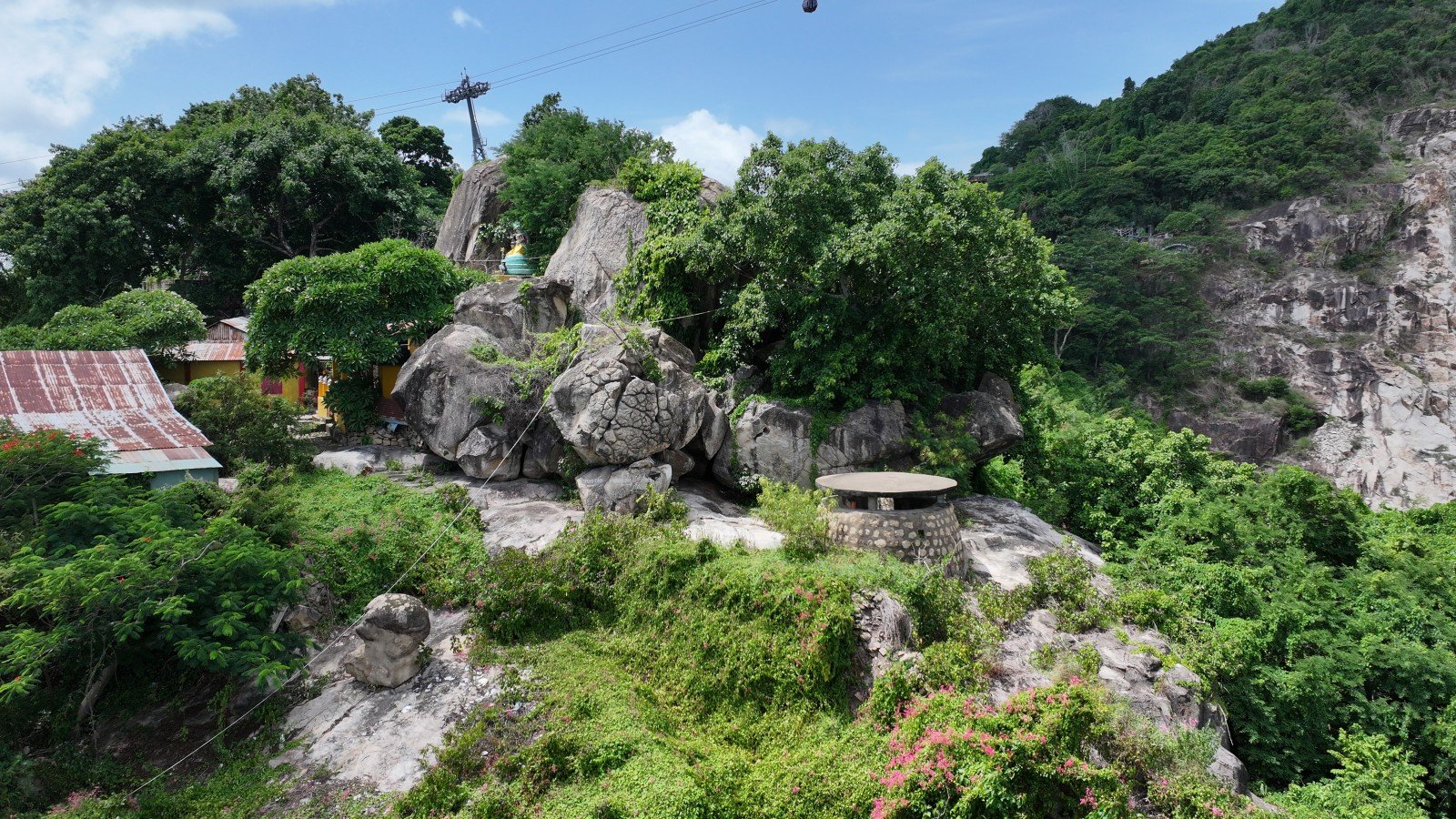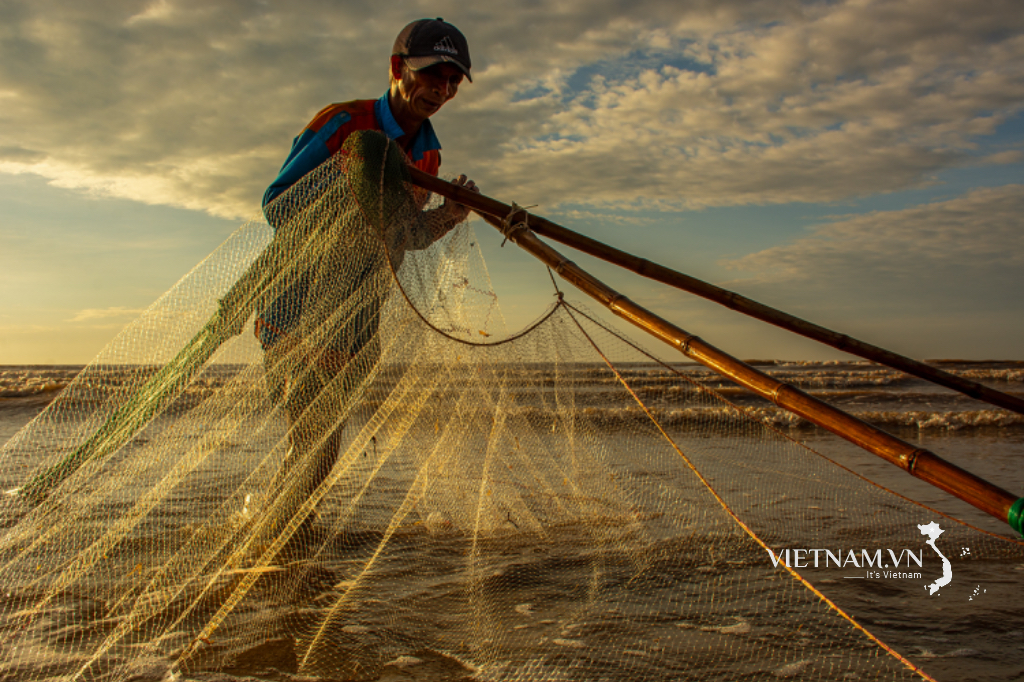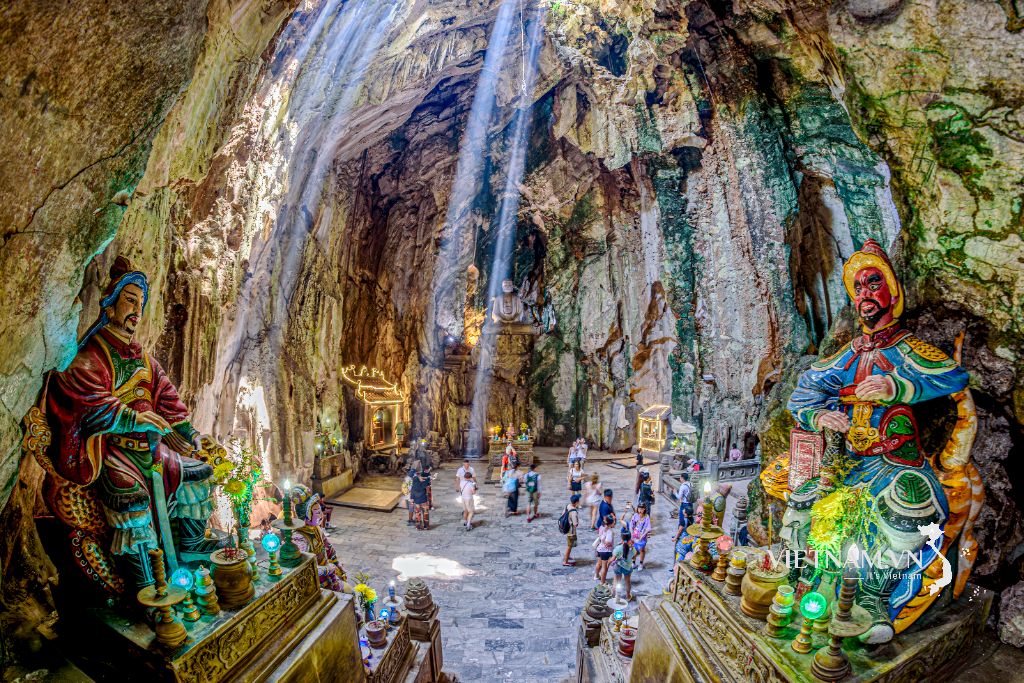Climbing the "white cloud" hill
After offering sincere prayers at the Lady of the Mountain Shrine on Sam Mountain, we visited the Thoai Mausoleum and then climbed the mountain slope to reach the sacred peak. Mrs. Nguyen Thi Ngoc (69 years old), whose house is near the Hoa Binh Bridge, was sitting in front of her house early in the morning. Next to her house lives a very aggressive red-faced monkey. Mrs. Ngoc said that the monkey had been released into the wild on the mountain by locals. Unexpectedly, it caused havoc throughout the temples and ransacked people's homes, so a local resident caught it and kept it confined. Soon, it will be taken to the Bay Nui region and released.
Bach Van Hill area. Photo: THANH CHINH
Sitting and chatting, Mrs. Ngoc recounted her life of over 40 years living in the mountains, witnessing countless changes. The temples here were established before 1975. On the full moon days, many tourists come to Mount Sam and climb over Bach Van Hill! During the peak of the Lady of the Mountain Festival, tourists climb the mountain to worship at the temples day and night.
Bach Van is one of two hills on Mount Sam, less than 100 meters high. If Mount Sam were shaped like a sea cucumber, Bach Van Hill would be the head and Da Chet Hill the tail. The name Bach Van means white cloud, but how could there be clouds on such a low hill? According to locals, around 1942, a lay Buddhist built a thatched hut on Bach Van Hill to practice meditation, naming it Bach Van Am. Since then, the hill has been called Bach Van, although its old name was actually Nho Mountain (Small Mountain). The hill has many large, precarious rocks piled on top of each other like shelters, creating beautiful natural caves where visitors can rest and enjoy the cool breeze.
On the hill there are about 10 temples, hermitages, and shrines, including a Buddha statue with a seven-headed serpent transforming into a dragon, and a statue of the Goddess of Mercy in front of Pham Huong Pagoda. Every year, in spring and summer, people from the surrounding area often come here to sightsee, eat, and have fun. The hill has a moderate altitude, many ideal flat areas, is breezy, and large rocks provide shade, creating a charming atmosphere. Mr. Tran Van Mach, a restaurant owner at the foot of Bach Van Hill, said that visitors only come in the summer, during the Vu Lan festival.
Viewing the plains from above.
Located over 200 meters above sea level, the Fortress Peak on Mount Sam is one of the most famous tourist destinations. In 1896, a French Commissioner built a sturdy villa on the Fortress Peak with many offices, also serving as a place for relaxation and recreation. The upper left floor features a tall, spiral-shaped tower for enjoying the breeze, hence the name Fortress Peak on Mount Sam. During the war, the enemy used the Fortress as an artillery base to fire at surrounding areas. In 1969, martyr Hoang Dao Cat destroyed the Fortress. Today, it remains a military base, but the villa no longer exists.
There are two main paths to the Fortress. The path behind the Confucius Temple is closer but steeper, suitable only for pedestrians. Along both sides of the path are many temples, hermitages, and eateries. Reaching the summit of the Fortress on a summer day, travelers will encounter rows of flamboyant trees blooming bright red, a beautiful sight. In the past, this path was somewhat difficult to navigate, but it has now been renovated and strengthened by the locals. Steps have been built on steep and slippery sections, and railings have been installed on precarious areas, making it easy for the elderly to ascend and descend. Near the Fortress is the ancient Giac Huong Pagoda, with its expansive backdrop, a picturesque resting place for enjoying the scenery.
The second route up the mountain is a nearly 3km long paved road called Thap Road, accessible by motorbike or car. This road was built during the French colonial period and later renovated and widened. Along the way, there are few temples, hermitages, or shops, but many beautiful rest stops and scenic spots such as Tao Ngo Garden, Dr. Nu's summer house, Long Son Pagoda, Truong Gia Mo Temple, and the remains of the stone pedestal where the statue of the Goddess used to sit...
Following the paved road, visitors must conquer the stone pedestal where the statue of the Goddess once stood, now a grand and spacious structure built by the local authorities. From this vantage point, visitors can gaze westward and see the vast and majestic Seven Mountains region. Additionally, visitors can see the Vinh Te Canal, dug under the command of the renowned official Thoai Ngoc Hau, running along the coast of Ha Tien, reminding us of a time when our ancestors pioneered and developed this border region, creating famous landmarks.
THANH CHINH
Source: https://baoangiang.com.vn/lang-du-tren-doi-a461606.html




































































![[Image] Ho Chi Minh City simultaneously commences construction and breaks ground on 4 key projects.](/_next/image?url=https%3A%2F%2Fvphoto.vietnam.vn%2Fthumb%2F1200x675%2Fvietnam%2Fresource%2FIMAGE%2F2026%2F01%2F15%2F1768472922847_image.jpeg&w=3840&q=75)





































Comment (0)